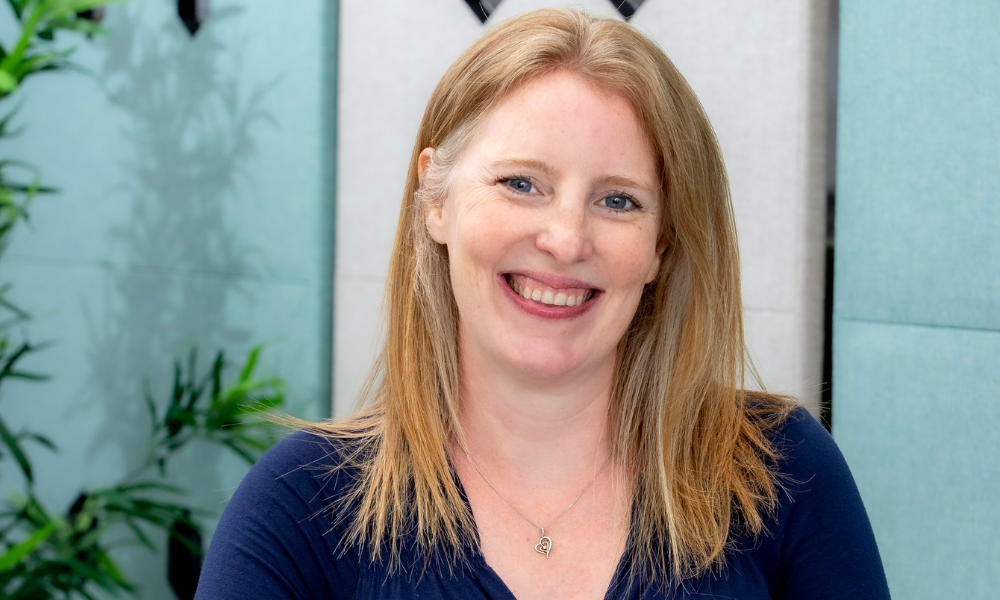Skipton Building Society steps up to the challenge with innovation

This article was written in association with Lucy Lewis, National Accounts Lead, Skipton Building Society. These views are Lucy’s own.
“There’s probably never been a more difficult time to be a first-time buyer,” reflected Lucy Lewis, national accounts lead at Skipton Building Society. “We have had massive house price growth over the past 20 years. Rents are high, so many people who are renting, struggle to save a deposit.
“We’re also facing the cost-of-living crisis and wage growth has not kept pace with inflation for much of the last two years. To help combat inflation, the Bank of England put up interest rates, which has had a knock on for buyers’ affordability as well.” She added: “At the moment it’s incredibly challenging and you can see that in the average ages of first-time buyers – which the latest government data puts at 34 in England.”
Skipton has certainly stepped up to meet the challenge. The 170-year-old, North-Yorkshire-based mutual building society recently launched its Track Record Mortgage, enabling eligible renters, aged 21 and above, to obtain a mortgage, without application or completion fees, to buy their first property, with little or no deposit and no guarantors.
Tenants who could prove affordability and evidence at least 12 months of rental payments within the last 18 months, could now borrow up to 100% of a property’s value, with Skipton’s five-year, fixed rate mortgage. It ensured that the monthly mortgage payment for each applicant was not more than the average of their last six months’ rental costs. Such was demand for the product that the building society has responded to feedback from brokers and customers and evolved the product to make it accessible to more renters stuck in the rental cycle.
“So long as they have not owned a property in the UK in the last three years, then they are eligible for the product,” Lewis explained. “I would imagine that we would continue to look at it to see what else we can do to enhance it along the way. You can’t change everything at once, you have to monitor how well it’s doing and what the effect of the changes are, but I would very much expect us to be continuing to innovate, safely and sensibly, to fill the need.”
“Our mortgage on a two-bedroom house was for £115,000 and that seemed incredibly expensive at the time. We had a choice - did we want a two-year fixed rate mortgage at 95% or 100%? The 5% deposit was £6,000. It’s not a small amount of money - we borrowed it from my uncle - but that was much easier to borrow than nowadays. The average first-time buyer deposit now stands at £34,500, where people are borrowing more than £25,000 as a deposit. So, times have certainly changed.”
She added: “I don’t remember being particularly nervous about it, I think we were reasonably relaxed - that’s the benefit of youth! I was just excited. When the sale went through, I remember us sitting in the house and saying, ‘Wow this is all ours!’ There’s not much that’s as exciting as buying your first house. We’re on our third house now and the last time we moved I decided I was never doing it again!”
Lewis began her career working for an intermediary and clearly values Skipton’s relationship with advisers.
“I think it’s incredibly important to work with brokers,” she emphasised. “Brokers offer borrowers choice and security and more than 90% of our business is intermediated. In terms of first-time buyers, they are vital to our market, and I believe they need brokers’ support because the home buying process is complicated and there are lots of different acronyms and terminology which they may not readily understand.
“It’s a highly regulated industry, but they know their products incredibly well, they have good contact with lenders’ BDMs (business development managers) and they do whatever they can to find the right finance option to meet the needs and the circumstances of individual customers.”
Despite the challenges facing first-time buyers, they continue to be a significant presence among UK buyers. Research from Hamptons estate agents in 2023 found they accounted for a record 27.1% of all buyers. It suggested too that as higher mortgage costs impacted the market, first-time buyers were adapting by buying smaller, cheaper properties. The average first-time buyer in Great
Britain appears to have reduced their budget by nearly £12,000, compared to last year.
“The government’s affordable homeownership scheme, Help To Buy, was great at helping people to get a foot on the ladder though I think it changed people’s perceptions of their first home,” Lewis reasoned. “Rather than buying a studio or a one or two-bed flat or a two-bed terraced house, I experienced people buying three-bed or sometimes even four-bed detached houses as their first homes. So that skewed perceptions of what was affordable. I think first-time buyers are reassessing what they are buying as their first properties, which may mean that the prices of flats hold up quite well in the future.”
She concluded: “The market is competitive and I believe we have a great proposition, and helping first-time buyers remains fundamental to Skipton’s strategy, so I can imagine you’ll see more of that from us going forward through our continued innovation and evolution of our products.”



